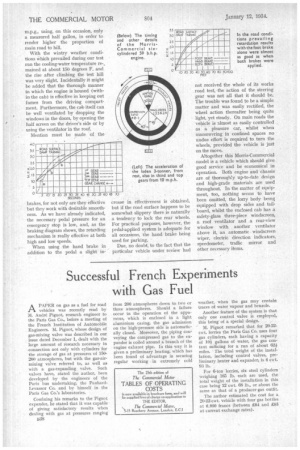Successful French Experiments with Gas Fuel
Page 56

If you've noticed an error in this article please click here to report it so we can fix it.
APAPER on gas as a fuel for road vehicles was recently read by M. Andre Pignot, research engineer to the Paris Gas Co., before a meeting of the French Institution of Automobile Engineers. M. Pignot, whose design of gas-mixing valve was described in our issue dated December 1, dealt with the large amount of research necessary in
• connection not only with cylinders for the storage of gas at pressures of 150200 atmospheres, but with the gas-airmixing valve referred to, as well as with a gas-expanding valve. Such valves have, stated the author, been developed by the engineers of the Paris bus undertaking, the PanhardLevassor Co. and by himself in the Paris Gas Co.'s laboratories.
Confining his remarks to the Pignot expander, he stated that it was capable of giving satisfactory results when dealing with gas at pressures ranging B38
from 200 atmospheres down to two or three atmospheres. Should a failure occur in the operation of the apparatus, which is enclosed in a light aluminium casing, the gas admission on the high-pressure side is automatically closed. Moreover, the piping con veying the compressed gas to the expander is coiled around a branch of the engine exhaust pipe. In this way it is given a preliminary heating, which has been found of advantage in securing regular working in extremely cold
weather, when the gas may contain traces of water vapour and benzoic.
Another feature of the system is that only one control valve is employed, this being of a special design.
M. Pignot remarked that for 20-22cwt. lorries the Paris Gas Co. uses four gas cylinders, each having a capacity of 10* gallons of water, the gas content sufficing for a run of about 62* miles. The total weight of the installation, including control valves, prelintinary heater and expander, is 4 cwt. 93 lb.
For 6-ton lorries, six steel cylinders weighing 165 lb. each are used, the total weight of the installation in this case being 12 cwt. 68 lb., or about the same as that of a producer-gas outfit.
The author estimated the cost for a 20-22-cwt. vehicle with four gas bottles at 6,950 francs (between £84 and 485 at current exchange rates).




































































































